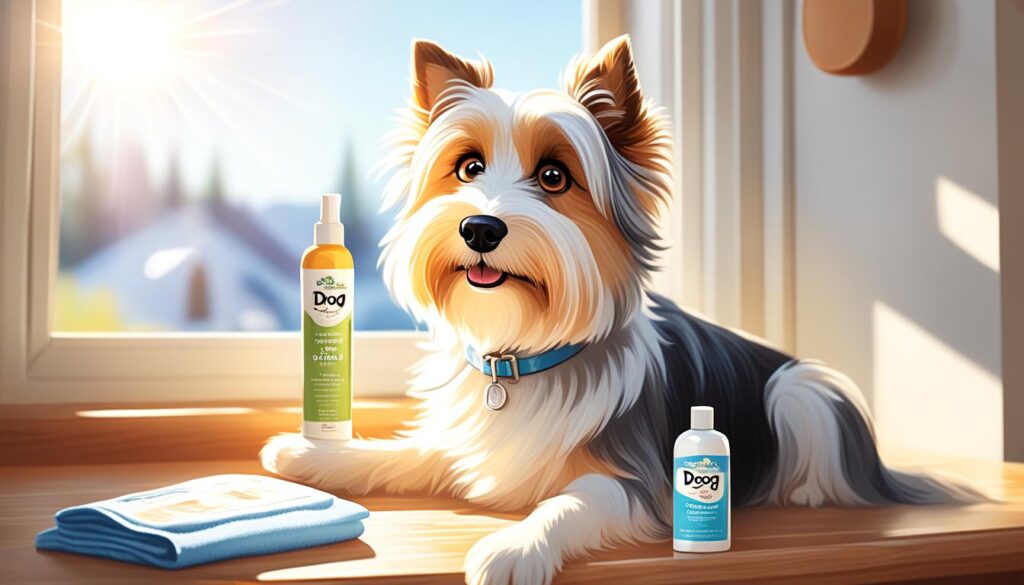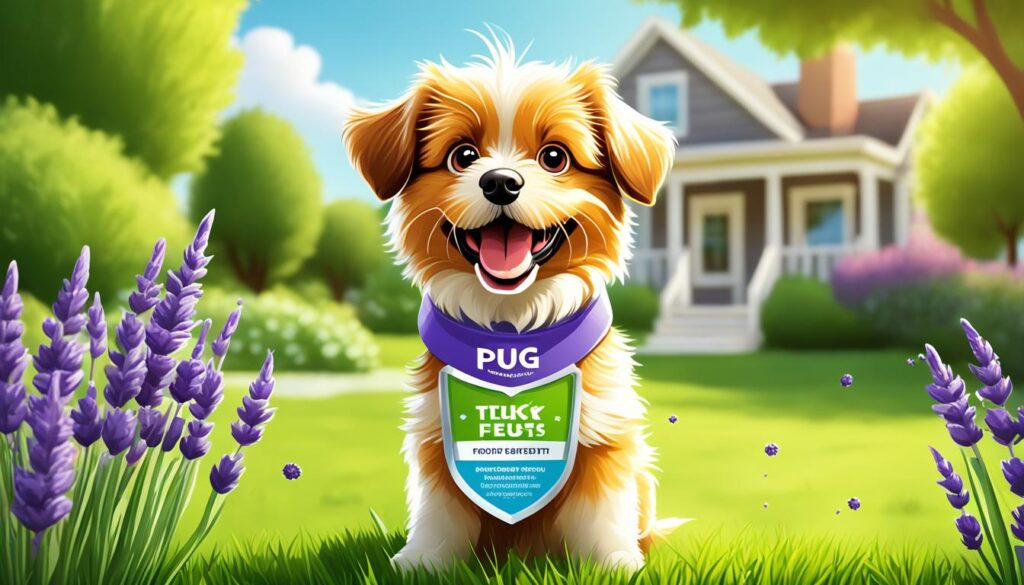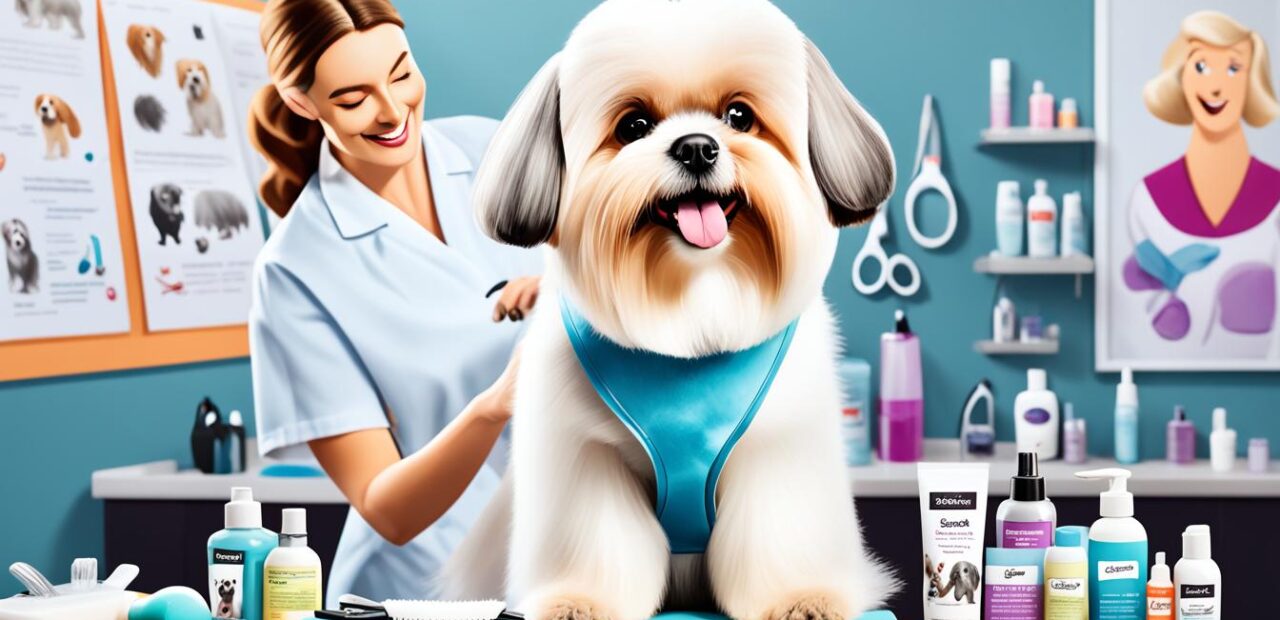Fido’s Fur: Skin and Coat Care
Did you know that the health of a dog’s coat can directly impact their overall well-being? A surprising statistic reveals that 67% of dogs suffer from skin and coat issues at some point in their lives. This highlights the importance of proper fur care to ensure your canine companion stays healthy and happy.
Key Takeaways:
- Taking care of your dog’s coat is vital for their overall health.
- A well-balanced diet plays a key role in maintaining a healthy coat.
- Regular brushing helps remove dirt, prevents shedding, and spreads natural skin oils.
- Occasional bathing keeps your dog’s coat clean and reduces shedding.
- Supplements and pest prevention measures can further enhance coat health.
Feed a Great Diet
Feeding your dog a high-quality diet is essential for maintaining their coat health. A well-balanced, nutritional food not only supports their overall nutrition but also plays a significant role in the health and appearance of their coat. When your dog receives the right nutrients, their skin and hair follicles stay healthy, resulting in a thick and moisturized coat with minimal shedding.
Consulting your veterinarian for dietary recommendations specific to your dog’s needs is crucial. They can provide you with expert advice on selecting a high-quality dog food that meets all their nutritional requirements. Remember, not all dog foods are created equal, and the quality of ingredients can vary significantly. Opt for dog foods that prioritize whole, natural ingredients and avoid fillers, artificial flavors, and additives.
When choosing the right dog food for your pet, here are key factors to consider:
- Quality of Ingredients: Look for dog foods that contain real meat as the primary ingredient, such as chicken, beef, or salmon. Avoid foods that list meat by-products or vague terms like “meat meal.”
- Complete and Balanced Formula: Ensure that the food you select is labeled as “complete and balanced,” indicating that it provides all the necessary nutrients for your dog’s overall health, including their coat.
- Omega-3 Fatty Acids: These essential fatty acids are beneficial for your dog’s coat health. They help reduce inflammation, promote a glossy coat, and minimize shedding. Look for dog foods that contain ingredients rich in omega-3 fatty acids, such as fish or flaxseed oil.
Your dog’s diet not only affects their coat health but also contributes to their overall well-being. Providing them with a high-quality, nutritious diet will ensure they receive the essential nutrients they need for a healthy and radiant coat.
| Benefits of a High-Quality Diet for Coat Health | Consequences of Poor Diet on Coat Health |
|---|---|
| Thick and moisturized coat | Dull and dry coat |
| Minimal shedding | Excessive shedding |
| Healthy skin and hair follicles | Increased risk of skin issues |
| Natural oils that promote a healthy sheen | Lack of natural oils leading to a coarse coat |
“Feeding your dog a high-quality diet is like giving them the foundation for a healthy and vibrant coat. The right nutrients provided through their food can make a noticeable difference in their coat’s appearance and shedding tendencies.”
To ensure your dog’s diet is well-balanced and suitable for their specific needs, consult with your veterinarian. They will guide you in selecting the right food and determining appropriate portion sizes based on your dog’s breed, age, size, and any specific health conditions they may have.
Regular Brushing
Regular brushing is crucial for maintaining your dog’s coat health. It not only keeps their fur looking clean and tidy but also provides numerous benefits for their overall well-being.
One of the primary advantages of brushing is removing dirt and grime that accumulates underneath the fur. Dogs love to explore, and their coat can easily trap dirt and debris from outdoor adventures. Regular brushing helps eliminate these particles, promoting a cleaner and healthier coat.
Another important aspect of brushing is the prevention of tangles and mats. Dogs with long or thick fur are particularly prone to these issues. Brushing helps detangle the hair, preventing painful knots that can lead to discomfort and skin irritation.
“Regular brushing helps remove dirt and grime, prevents tangles and mats, and distributes natural oils.”
Additionally, brushing helps in the elimination of loose hair, reducing shedding and keeping your home cleaner. By removing the loose hair, you can minimize the amount of fur your dog sheds around the house.
Furthermore, brushing plays a vital role in distributing your dog’s natural skin oils throughout their coat. These oils act as a natural moisturizer, keeping the fur healthy and providing a beautiful sheen. Regular brushing helps spread the oils evenly, ensuring optimal coat condition.
Make brushing sessions a positive experience for both you and your furry friend. Use a suitable brush or comb that is appropriate for your dog’s coat type and length. Take your time, be gentle, and reward your dog with praise or treats to create a positive association with grooming.
To further enhance the benefits of brushing, establish a regular grooming schedule. The frequency depends on your dog’s coat type, with longer-haired dogs generally requiring more frequent brushing. Consult your veterinarian or a professional groomer for guidance on the ideal brushing routine for your specific dog.

| Benefits of Regular Brushing | How It Helps |
|---|---|
| Removes dirt and grime | Prevents skin irritation, promotes cleanliness |
| Prevents tangles and mats | Reduces discomfort, maintains coat health |
| Eliminates loose hair | Reduces shedding, keeps home cleaner |
| Distributes natural oils | Moisturizes coat, enhances sheen |
In conclusion, regular brushing is essential for keeping your dog’s coat in optimal condition. Not only does it remove dirt and prevent tangles, but it also helps distribute natural oils for a healthy and shiny coat. Make grooming a bonding experience with your canine companion and consult professionals for guidance on the best brushing practices.
Occasional Bathing
Giving your dog the occasional bath is another important aspect of coat care. Bathing keeps your dog clean and helps eliminate loose fur, reducing shedding. However, it’s vital not to bathe them too frequently, as it can dry out their skin and fur, leading to a dull and coarse coat. Use a canine-formulated shampoo and consult your vet for bathing frequency guidelines.
A bath not only helps in maintaining a clean coat but also contributes to the overall health of your furry friend. Here are some tips to ensure a successful bathing experience:
- Prepare everything you need before starting the bath: shampoo, towels, and a gentle brush.
- Choose a warm and quiet bathing area, like a bathroom or a yard. Avoid bathing your dog outside in extreme weather conditions.
- Gently brush your dog’s fur to remove any tangles or mats before getting them wet.
- Wet your dog’s fur thoroughly with lukewarm water. Be careful not to spray water directly into their ears and eyes.
- Apply a canine-formulated shampoo, lathering it into their coat while massaging their skin. Focus on areas that are prone to dirt and odor.
- Rinse your dog thoroughly to ensure all shampoo is removed, as leftover residue can irritate their skin.
- Use a towel to pat your dog dry, being careful not to rub vigorously. You can also use a hairdryer on the lowest heat setting, keeping it a safe distance away from your dog.
- If your dog is receptive, you may brush their fur again gently after they are fully dry.
Bathing frequency may vary depending on your dog’s breed, coat type, and lifestyle. Dogs with oily skin or those who spend a lot of time outdoors may require more frequent baths. Consulting your vet will help determine the ideal bathing schedule for your canine companion.
Supplements and Pest Prevention
While regular grooming and a balanced diet are crucial for maintaining your dog’s coat health, some dogs may benefit from dietary supplements to further promote hydration and skin health. Common dietary supplements that contribute to a healthy and vibrant coat include:
- Omega-3 fatty acids: These supplements provide essential nutrients that contribute to good skin health and fur moisture.
- Coconut oil: Known for its moisturizing properties, coconut oil can help prevent dryness and itching, improving overall coat condition.
- Fish oil: Rich in omega-3 fatty acids, fish oil can enhance skin health and promote a glossy and healthy coat.
Before introducing any supplements to your dog’s diet, it’s important to consult with your veterinarian. They can provide guidance and recommendations based on your dog’s specific needs and health condition. Each dog is unique, and what works for one may not work for another.
In addition to dietary supplements, protecting your dog from pests such as fleas, ticks, and worms is vital for maintaining their coat quality and overall well-being. Preventative medicines recommended by your veterinarian can effectively control pests and minimize the risk of infestation.

By staying up-to-date on preventative pest control measures, you can keep your dog comfortable and healthy, preventing skin irritations and other health issues related to infestations.
Conclusion
Taking care of your dog’s coat is crucial for their overall health and well-being. By providing them with a high-quality diet, regular brushing, occasional bathing, and potential supplements, you can help maintain a healthy and vibrant coat.
A well-balanced and nutritional diet is the foundation for a beautiful coat. Consult your vet for dietary recommendations based on your dog’s specific needs. Regular brushing not only removes dirt and tangles but also spreads natural skin oils, moisturizing the coat and giving it a healthy sheen.
Occasional bathing keeps your dog clean and reduces shedding by getting rid of loose fur. However, be cautious not to overdo it, as frequent bathing can dry out their skin and fur. Use a canine-formulated shampoo and follow your vet’s guidelines for bathing frequency.
In addition to diet and grooming, consider supplements such as omega-3 fatty acids, coconut oil, or fish oil for further fur hydration and skin health. Always consult your vet before introducing any supplements.
Lastly, protect your dog from pests like fleas, ticks, and worms to safeguard their coat quality. Regularly use preventative medicines recommended by your vet to keep these nuisances at bay.
Remember, every dog is unique, and consulting your vet for personalized recommendations and guidelines is essential to ensure the best care for your furry friend. With proper nutrition, grooming, and protection, you can help your dog maintain a healthy and shiny coat for a lifetime of happiness and comfort.
FAQ
How does diet affect my dog’s coat health?
Feeding your dog a high-quality diet helps maintain their coat health by keeping their skin and hair follicles healthy, resulting in a thick and moisturized coat with minimal shedding. Consult your vet for dietary recommendations.
Why is regular brushing important for my dog’s coat?
Regular brushing is crucial for maintaining your dog’s coat health as it helps remove dirt and grime, eliminates loose hair to prevent shedding, and prevents tangles and mats. Brushing also spreads natural skin oils, moisturizing the coat and giving it a healthy sheen.
How often should I bathe my dog?
It’s important not to bathe your dog too frequently as it can dry out their skin and fur, leading to a dull and coarse coat. Use a canine-formulated shampoo and consult your vet for bathing frequency guidelines.
Can dietary supplements improve my dog’s coat health?
Some dogs may benefit from dietary supplements such as omega-3 fatty acids, coconut oil, and fish oil to moisturize their fur and promote a healthy coat. However, consult your vet before giving any supplements to your dog.
Why is pest prevention important for my dog’s coat?
Protecting your dog from pests like fleas, ticks, and worms is crucial for maintaining their coat quality. Stay up-to-date on preventative medicines recommended by your vet to ensure your dog’s coat remains healthy.
How can I maintain a healthy coat for my dog?
To maintain a healthy coat for your dog, provide them with a high-quality diet, regular brushing, occasional bathing, and potential supplements. Also, prioritize protecting them from pests. Consult your vet for personalized recommendations and guidelines for your furry friend.



